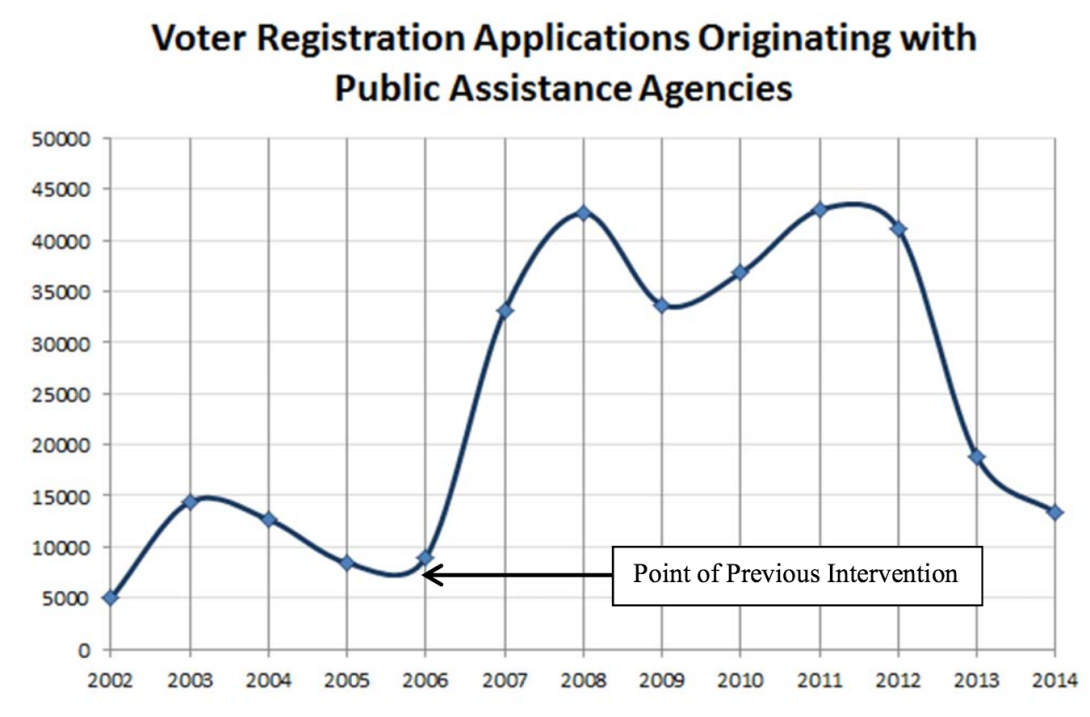INSTITUTE INDEX: North Carolina sued over voter registration failings

A graph submitted as part of a lawsuit over North Carolina's failure to adhere to federal voter registration requirements show how registrations through public assistance agencies began climbing after voting rights advocates intervened in 2006 but then plummeted after the Republican takeover of state government in 2012.
Date on which an alliance of voting rights advocacy groups and individual voters sued North Carolina state government officials for noncompliance with federal voter registration laws: 12/15/2015
Year in which the lawsuit notes a steep decline in the number of voter registration applications from driver's license offices and state agencies that operate public assistance programs, which was the same year Republicans took control of state government for the first time in over a century: 2012
Year in which Congress passed the National Voter Registration Act, which requires certain state agencies to provide voter registration services to those they serve: 1993
Percent by which the number of applications for Food and Nutrition Services, Work First and Medicaid submitted to the state Department of Health and Human Services (DHHS) dropped between 2011 and 2013: 13.8
Percent by which DHHS-generated voter registrations fell over the same period: 56
Number of DHHS offices where voting rights advocates conducted field investigations last year that confirmed frontline staff are consistently failing to offer voter registration services as required by law: 19
Of those 19 offices, number where employees conceded that they did not even have voter registration applications on site: 4
Of the 196 DHHS clients the advocates interviewed, percent who did not see or respond in writing to a voter registration question on their forms, were not asked whether they wanted to register and did not receive a registration application: 74.5
Number of times the voting rights investigators documented DHHS and DMV offering federally mandated voter registration services to people applying for benefits or renewing their driver's licenses or state identification cards: 0
Month in which Alexandria Marie Lane went to the DMV office in Wake County, North Carolina, to get a driver's license and tried to register to vote: 5/2014
Date on which she attempted to vote early only to be told she was not registered: 10/27/2014
Maximum number of days it's supposed to take for completed voter registration applications to be transmitted to state election officials: 10
Month in which Sherry Denise Holverson visited a DMV office in Hoke County, North Carolina, to update the address on her driver's license and explicitly asked for her voter registration information to be updated: 6/2014
Date on which she went to cast an early ballot only to be told she was not on the voter registration rolls: 10/31/2014
Month in which Isabel Najera visited the DMV office in Sampson County, North Carolina, to apply for a driver's license and filled out voter registration paperwork only to be told later at the polls that she was not registered: 10/2014
Of the provisional ballots cast by Lane, Holverson and Najera — all plaintiffs in the lawsuit — after being told they were not registered, number that were ultimately counted: 0
Year in which voting rights advocates previously contacted the North Carolina elections board to report that state agencies were failing to adhere to federal voter registration law, which led to dramatic improvements in compliance: 2006
Date on which plaintiffs in the lawsuit first formally notified North Carolina officials about the re-emergence of voter registration problems: 5/8/2015
Date on which they again formally notified the state about the apparent violations: 6/1/2015
Date on which North Carolina State Board of Elections Executive Director Kim Strach, one of the defendants, released a statement saying she was surprised by the suit, which the plaintiffs said was necessitated by state officials' foot-dragging: 12/15/2015
(Click on figure to go to source.)
Tags
Sue Sturgis
Sue is the former editorial director of Facing South and the Institute for Southern Studies.
